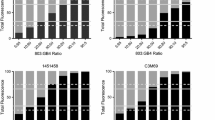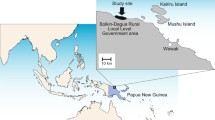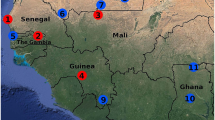Abstract
THE complexity of the life cycle of malaria parasites and the lack of suitable strain characters which could be used as genetic markers have made genetic studies of these organisms difficult. We have now available, however, a number of strains of Plasmodium berghei isolated from wild rodents and mosquitoes in Africa, which can be differentiated from one another by starch-gel electrophoresis of certain enzymes1. We have also derived parasite lines resistant to the drug pyrimethamine from some of these strains, and such resistant lines remain stable even in the absence of the drug. By making crosses between lines which differ in both enzyme type and drug sensitivity, we have been able to obtain parasites exhibiting recombinant characters.
Similar content being viewed by others
References
Carter, R., Trans. Roy. Soc. Trop. Med. Hyg., 64, 401 (1970).
Diggens, S. M., Gutteridge, W. E., and Trigg, P. I., Nature, 228, 579 (1970).
Peters, W., Exp. Parasitol., 17, 80 (1965).
Yoeli, M., Upmanis, R. S., and Most, H., Parasitology, 59, 429 (1969).
Warhurst, D. C., and Folwell, R. O., Ann. Trop. Med. Parasitol., 62, 349 (1968).
Author information
Authors and Affiliations
Rights and permissions
About this article
Cite this article
WALLIKER, D., CARTER, R. & MORGAN, S. Genetic Recombination in Malaria Parasites. Nature 232, 561–562 (1971). https://doi.org/10.1038/232561a0
Received:
Revised:
Issue Date:
DOI: https://doi.org/10.1038/232561a0
- Springer Nature Limited
This article is cited by
-
A flow cytometric assay to quantify invasion of red blood cells by rodent Plasmodium parasites in vivo
Malaria Journal (2014)
-
Genetic linkage and association analyses for trait mapping in Plasmodium falciparum
Nature Reviews Genetics (2007)
-
Plasmodium post-genomics: better the bug you know?
Nature Reviews Microbiology (2006)
-
Predominance of infected reticulocytes in the peripheral blood of CD4+ T-cell-depleted mice chronically infected withPlasmodium chabaudi chabaudi
Parasitology Research (1994)





